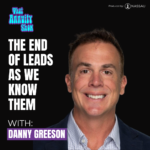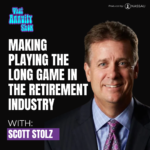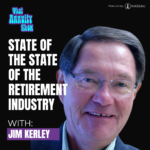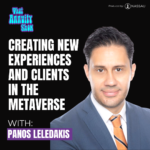Language is powerful. It’s exceptionally powerful in the highly regulated world of retirement planning. Michelle Richter, Principal at Fiduciary Insurance Services joins us today to give us a lesson in regulatory grammar and how recent new rules from the Department of Labor may change them.
Also, do you want to get regular updates on news about guests of our show? Subscribe to our newsletter, below!
We hope you enjoy the show.
Links mentioned today:
Connect with Michelle on LinkedIn: https://www.linkedin.com/in/michelle-richter/
Listen
Watch
Receive Updates
Show Sponsors
The discussion is not meant to provide any legal, tax, or investment advice with respect to the purchase of an insurance product. A comprehensive evaluation of a consumer’s needs and financial situation should always occur in order to help determine if an insurance product may be appropriate for each unique situation.
EPISODE TRANSCRIPTS:
Paul Tyler:
Language is powerful. It’s exceptionally powerful in the highly-regulated world of retirement planning. Michelle Richer, principal at Fiduciary Insurance Services joins us today to give us a lesson in regulatory grammar, and how recent new rules from the Department of Labor may change them. We want to thank our primary sponsor and my employer by day, Nassau Financial Group. We are working harder to be your carrier of choice. We support you with best-in-class service. We seek to keep things simple, and we’ll have your back in years to come. We’re headquartered in Hartford, Connecticut with 19 billion in assets under management, and serve over 400,000 policyholders. We’ve been doing this a long time, 170 years, but remain humble enough to always try to improve. Also, do you want to get regular updates on news about guests of our show? Go to thatannuityshow.com and subscribe to our newsletter today. We hope you enjoy the show.
Intro:
Welcome to That Annuity Show, the podcast that will make you an expert in explaining annuities to your clients. Give us 30 minutes each week, and we’ll shave hours from your client presentations. Now here’s your host, Paul Tyler.
Paul Tyler:
Hi, this is Paul Tyler, and welcome to another episode of That Annuity Show. Ramsey, how are you?
Ramsey Smith:
Very good. Always glad to be here.
Paul Tyler:
Yeah, lot of talk about today. We’ve had an interesting theme running through some of these conversations around language. Jason, we talked about, how do you frame decisions around when to take social security? We had some great discussion with Cyrus on how to describe protective income, and we’re, I think, in that same vein, we’ve got another great guest, returning guest, to talk about a lot of important topics to our business, but also language and what exactly do labels mean and what labels should we adopt. Ramsey, do you want to do the intro?
Ramsey Smith:
So in terms of policing language, I’ll just say that our next guest, this one goes to 11. Right. So, we’re very pleased to be joined today by my good friend, Michelle Richter. Michelle previously, for many years, had worked for a global actuarial firm, and has broken out on her own in the last year or so, and is doing amazingly well with a whole bunch of new clients. We’re very excited to have her on the show, hear about how her business is developing, but also very importantly, hear more about these various topics, these various linguistic issues that we’re dealing with from a regulatory perspective, and frankly, just from an existential perspective in this industry. So, with that, Michelle. Introduce-
Michelle Richter:
It’s going to go deep, Ramsey, if we’re-
Ramsey Smith:
… Tell us about the name of your new business and how you got it started.
Michelle Richter:
… Sure.
Ramsey Smith:
I mean, it’s a great entrepreneurial journey. You’ve recently taken over a new leadership position in the industry as well, and you are publishing-
Michelle Richter:
Yes.
Ramsey Smith:
… more prolifically than I can ever remember. And it’s been great because you put out a lot of good stuff. So rock and roll.
Michelle Richter:
Thank you. Thank you so much, and it’s oh my goodness, it couldn’t be more of a pleasure to be back here. So thank you so much for having me. And the last time that I was here, I earned one of my favorite clients. Did you [crosstalk 00:03:54] tell you this?
Ramsey Smith:
No. No.
Paul Tyler:
We need these stories. So where-
Ramsey Smith:
Please, tell us.
Michelle Richter:
Yes.
Ramsey Smith:
Go ahead.
Michelle Richter:
Yes. So, I’m now working with RISA profile, who is a previous guest of yours and the relationship started not with the time that I flew to Texas, basically just to meet Wade Pfau, in the middle of the night, that made no impression whatsoever. It was my appearance on That Annuity Show that Alex Maria saw that caused him to reach out and say, “Yeah, we maybe could benefit from working together.”
Paul Tyler:
… Excellent.
Michelle Richter:
But he was right.
Ramsey Smith:
That is fantastic. Look, I think one of the most satisfying things about this show is that… And we always say the guests make the show, Paul and I just are lucky enough to be here. The guests make the-
Paul Tyler:
By the way, I’m just hanging on to Ramsey, that’s all.
Ramsey Smith:
… Not hardly. The guests make the show, but part of it is the guests get to be there… You get to be your best self. And we keep on hearing stories like this, where there’s been a great sort of point of inflection career-wise or otherwise after appearing on the show. So we love these stories and as you develop more from your appearances, share them with us, because we’d love to hear them.
Michelle Richter:
I, on one hand, I hope I get more, but on the other hand, because I’m at capacity not taking new clients until 2024, I kind of hope that doesn’t happen.
Ramsey Smith:
Can I tell you that is such a boss move, right? It’s a boss move. I love this. So Michelle sends a note out. I don’t know whether this is in LinkedIn or elsewhere, and said, “I just want everybody to know I’m booked til 2024. So if you had any designs on working with me, you missed out. See you in 2025.”
Michelle Richter:
It-
Ramsey Smith:
That was such a great move. That was so baller.
Michelle Richter:
… Thank you. Thank you very much. And that’s actually the third time this week I’ve been called that.
Paul Tyler:
All right.
Michelle Richter:
I’m not even kidding.
Ramsey Smith:
Fantastic.
Michelle Richter:
I’m living my best life.
Ramsey Smith:
There you go.
Michelle Richter:
I can’t deny it.
Ramsey Smith:
All right. So for-
Michelle Richter:
Yes, to business.
Ramsey Smith:
… Tell the audience what you’ve been up to.
Michelle Richter:
Yes. So my business is incredibly creatively named Fiduciary Insurance Services, just like any good insurance person would do just name exactly what you’re doing. But to be a little less, not funny, but a little more serious, the way that I saw what I wanted to do and what I wanted to be was fiduciary, which is somebody who takes very seriously their responsibility to their clients and is prepared to represent that they’re the superlative. That they’re the best. So a fiduciary is somebody who’s prepared to represent. I’m giving you my best advice. I’m doing the absolute best and I’m the best in my… Or I’m within the best class of my community. And so insurance because insurance is what I’m obsessed with and services is I do verbs. I sell verbs and I don’t sell nouns.
Ramsey Smith:
So this really at the heart of frankly sort of the way this point of inflection in your career and your life. So we should dig it a little bit deeper. And I told Michelle before the show, I’ve borrowed her nouns versus verbs paradigm for a presentation I’m giving later this week. So thank you for that. And again, full credit to Michelle Richter for that wisdom.
Michelle Richter:
No. I’m so glad it resonated.
Ramsey Smith:
But let’s talk about that. Tell us about the nouns versus verbs paradigm and why you think it’s a way to describe the difference between the traditional fiduciary and what we do on the insurance side.
Michelle Richter:
Yeah. And it’s, the amount of information that I’m going to be able to tie back to this premise is going to be pretty incredible. I think when we see at the end of the show. But at this moment, I would expect the audience to be pretty skeptical that it’s going anywhere good. In all seriousness though, insurance is… So I’ve had the great pleasure of having had the opportunity to run a corporate RIA, a multi-billion dollar IA for a fortune 100 insurance company. And I also had the good fortune of being a product developer, or I should say an intellectual property developer, which ultimately was service marked at that time by virtue of the distinction in my mind between nouns and verbs.
Michelle Richter:
And so in running an RIA and in also running an insurance business, I think a person winds up… And a person who sits in the seat of regulatory principle for those entities winds up with a lot of background information on the regulatory frameworks under which either verbs or nouns are compensated. And one incredibly important tenant that I feel doesn’t get communicated to financial professionals well enough is that one does not receive compensation for both at the same time. So one-
Ramsey Smith:
Can you hold on just one second, because I want to make sure the audience understands who sells what? So let’s just start with the basics. And if you said that, I’m sorry I missed it, but-
Michelle Richter:
… No, I didn’t. I didn’t.
Ramsey Smith:
… Okay. Let’s talk about who sells nouns and then who sells verbs.
Michelle Richter:
Agents and brokers.
Ramsey Smith:
Got it. Okay.
Michelle Richter:
RIAs.
Ramsey Smith:
RIAs, sell verbs.
Michelle Richter:
RIAs sell verbs. Correct. And agents and brokers sell nouns. And to the extent that any verbs get provided in the sale of those nouns, they are solely incidental to the noun sale. That’s what the loss is.
Paul Tyler:
Okay. So, sorry. Sorry. Let me go really slow. So I am an insurance agent-
Michelle Richter:
Yeah, let’s go super slow.
Paul Tyler:
… I sell Ramsey and annuity. I’m selling him a noun.
Michelle Richter:
Yes. Yes.
Paul Tyler:
I help Ramsey plan for retirement that possibly could benefit from an annuity. Am I breaking law, because I’m not a licensed planner?
Michelle Richter:
Only if you’re charging for the service.
Paul Tyler:
Okay. So if I’m charging for the verb, it’s a problem. If I’m charging for the noun, I’m okay. Okay.
Michelle Richter:
Yeah. That’s right.
Paul Tyler:
I like this.
Michelle Richter:
Right. Because you sell nouns. Sell means receive remuneration and exchange for.
Paul Tyler:
Is that a bad thing?
Michelle Richter:
No, it’s a wonderful thing. I buy nouns all the time. And for me, it’s just really important to know what’s happening right now. Am I buying a noun or am I buying a verb? So when I go to look at a house and I did. The last time I bought a condo, I used a real estate agent and she received a commission for helping me and there was no chance I was going to do all that work on my own, and thank God she was there. Right. But she wouldn’t call herself my real estate advisor. She was my real estate agent. She helped me buy and sell the property, which is a noun.
Ramsey Smith:
Okay. So I think that before long, you’re going to have to turn all this into a schoolhouse rock song.
Paul Tyler:
Yes.
Ramsey Smith:
It’s just-
Michelle Richter:
It’s true. But there’s so much obvious… Excuse me, so much confusion. Intentional confusion created around the differentiation between those regulatory frameworks. And that’s why I’m constantly on LinkedIn correcting people for saying things like that.
Paul Tyler:
Sure. Well, and I’m looking at the clock it’s February. February 2021. This was a big month for nouns and verbs in the insurance space. And I don’t know if we get here now or, we Ramsey, we wait a little bit. Because I’m confused. I’m noun and verb confused as are many people in this business.
Michelle Richter:
Yeah. Well, yeah. I mean, so I think, Paul we’re talking about DOL or the Department of Labor’s rollover guidance and how it impacts our community as distinct from how it impacts other pieces of the financial professional ecosystem. And it’s going to be a really challenging time in our space, I think, as we all figure out how it is that we’re supposed to operate under these new expectations. In the past, it was either the DOL took the perspective that a one time transaction, which is what insurance is, because it historically has been.
Michelle Richter:
Now in sales, it’s usually not. Doesn’t meet what DOL calls that five-part test for under ERISA. But since they reinterpreted it and since they’re going to be applying prohibited transaction exemption, 2020-02 and revising an old prohibited transaction exemption, that would have been relied upon by the insurance industry, if they were not revising it, it creates this unbelievably confusing landscape for our industry to be operating in. And we kind of don’t know exactly how so some of these things will shake out as they’re coming before July 1st, as they’re looking into how to enforce this. But it’s going to be impactful to agent business models and in part, because for the fixed noun sellers in our space, there is no regulatory overseer that can serve as financial institution for them.
Ramsey Smith:
… So. All right. Let’s just walk it back here. Right?
Michelle Richter:
Stop. Yeah. Okay.
Ramsey Smith:
So let’s go the life of an agent. Let’s take an agent. Let’s talk about what that means. So I’m an agent, I go out and I have clients, I’m selling my nouns. I come across a client, that’s got money and I want to do a rollover. Let’s go specifically what the day to day experiences for a noun seller, aka an agent.
Paul Tyler:
Right. And it’s one noun versus another noun. If the noun is a qualified noun.
Michelle Richter:
Yeah. So if you’re selling qualified nouns now, if you want to qualify for prohibited transaction exemption, 2020-02, you need to have a financial institution that oversees your conduct and that can sign with you, that you are acting in a fiduciary capacity. That’s really new for our world. And it does not fit with demutualization. So meaning it does not fit with not career agents, because the insurance companies will not serve as co-fiduciary. So, because that is how it is panning out, and the fact that the industry had intended instead of allowing agents to use 2020-02 with the insurer as co-fiduciary, they instead indicated that they would use PT8424, which is an old exemption. But labor’s now modifying that. The material difference between those laws or those abilities to roll that money over is 2020-02 requires you to be a fiduciary. Whereas, 8424 just requires disclosure of compensation that it not be unreasonable. And you’re not claiming to be a fiduciary.
Paul Tyler:
Okay. One piece of trivia PTE84, why was it named 84 Ramsey? Do you know?
Ramsey:
I don’t know. The numbers are so different.
Paul Tyler:
It was-
Ramsey:
I don’t know why they’d be so different.
Paul Tyler:
… so creative.
Ramsey:
Do tell.
Paul Tyler:
It was written in 1984. That’s it.
Ramsey:
Right. Was the other one written in 1922?
Paul Tyler:
No.
Ramsey Smith:
So you lost me, man.
Paul Tyler:
No, PTE20, 2020. It was written in 2020.
Ramsey Smith:
Oh 2020. Oh, fair enough. Got it. Yeah. We’re in a new century.
Paul Tyler:
Right. Just to help it-
Ramsey Smith:
Go figure.
Paul Tyler:
… It kind of helps you think. Well, it actually, a little bit of trivia actually helps because all the insurance companies are relying on this definition 81984 to protect us right now.
Michelle Richter:
Right. And think about it, it hasn’t been revised since then, because nobody needed to rely upon it, because nobody was tripping up the five-part test in how it was being interpreted before. But now that it’s being interpreted differently, now the industry is needing to rely on one of those PTs. And in the case of an independent agent there isn’t an overseeing. They would oftentimes work with an IMO or FMO to help with marketing, but those organizations aren’t responsible for regulatory oversight. So that places them in an awkward position because they’re going to need to attest for themselves that they have satisfied 81984.
Ramsey Smith:
Well, so let’s talk about that. What should they do? Should they go out and find a financial institution? So the insurance companies won’t help them. The IMOs at this point, aren’t set up to do it. Although, I know that in the previous iteration with the DOL there were some IMOs that were thinking about adding that capacity. But that’s still developing it best, right?
Michelle Richter:
Yes. Developing at best. I hope. I hope it develops.
Ramsey Smith:
Okay. But, what can they do now? Do they have to sit on the sidelines or what can they do?
Michelle Richter:
I think we’re going to find out. I think that’s what’s under negotiation at the moment.
Ramsey Smith:
[crosstalk 00:18:37].
Michelle Richter:
Right. So-
Paul Tyler:
Yeah. I’ll give you late-breaking, real-time picture. We had a number of our distributors for meeting and talked exactly about this topic. And question from one of our distributors, well, wait a second, if our agent doesn’t… If the agent says they did this and got the client and they have the records, but they don’t, who’s liable here? Michelle, is there a difference between a fiduciary with capital F or a small F in this world?
Michelle Richter:
… So if they’re relying on 8424, then they’re not a fiduciary. I do not know how they’re going to modify the language in 8424, yet. But my hope is that it’s tight. But I think there will be material negotiation that’ll occur around this. I think what is likely at the moment is that there will be an expectation of best interests being met. I don’t think that 8424 is going to go as far as fiduciary or that somebody going to have to rep for that. 2020-02 does do that, but the industry isn’t looking to use it. And the industry is looking to modify 8424, and I think it will come shy of that representation. But it’s still being negotiated.
Paul Tyler:
Well, as an aside, there actually, a lawsuit was filed in Texas to challenge this. And Ramsey, I actually got an inbound, unsolicited inbound of the people wanting to come on our show and talk about their lawsuit. So I don’t know, Michelle, what do you think? Would that-
Michelle Richter:
Tell me more. What lawsuit? What happened?
Paul Tyler:
… There’s a lawsuit challenging this, the DOL rule filed in Texas.
Michelle Richter:
Oh. Oh. Oh, I know what you’re talking about.
Paul Tyler:
Filed in Texas by an industry group. I would suspect there’ll be more. We’ll see more in an effort to better define what does this mean. Verb versus noun. Crazy. Crazy world.
Michelle Richter:
Yeah. Well, yes, I think there’s going to be another round of clarifications before anything goes into effect for… As relates to the July 1st deadline. Not as relates obviously to the February 1st deadline. I expect we’re going to see more clarification.
Ramsey Smith:
So first of all, Paul, sure. Why not? We should have them on if they have something to say.
Paul Tyler:
Right. Right.
Ramsey Smith:
But now, so now Michelle, the next piece of this, you developed some very sort of strong opinions and you, right? But no-
Michelle Richter:
Yes.
Ramsey Smith:
…. and you share them and you address some pretty important organizations pretty directly, like FINRA, the SEC. So now, most people do that with some trepidation. You are-
Michelle Richter:
That’s true.
Ramsey Smith:
… You are fearless. And I’m curious have they-
Michelle Richter:
That’s because I’m cracked.
Ramsey Smith:
… Good on you. I mean, so have you ever gotten any response from them yet? Do you expect at some point you might hear-
Michelle Richter:
Not yet.
Paul Tyler:
Interesting.
Michelle Richter:
I hope so, because I’m not tagging them to be silly or to annoy them. I’m tagging them on points that I think are really important for them to consider. And in particular as it relates to the identities of people who distribute insurance, I think there’s insufficient guidance given as it relates to those intersections between how one interacts in an insurance community relative to a wealth managing community.
Ramsey Smith:
… Okay. You gave a good segue there, because we talked about this. We talked about in a world where we all spend a lot of time thinking about identity, sometimes it cuts both ways. Sometimes it’s good. Sometimes, it’s great to some issues obviously in the broader society. But in here, in this space, you came to a really interesting realization about the business you wanted to build and this distinction between services and things. And-
Michelle Richter:
That’s right.
Ramsey Smith:
… And the place, the very unique place you wanted to carve out. So, so tell us about that discovery process and then how you’ve implemented it into a business.
Michelle Richter:
Okay. This is going deep guys. And it’s going to be real fun.
Ramsey Smith:
That’s how we roll.
Michelle Richter:
Okay. All right. So, I fashion myself an intellectual property developer. Okay. That’s how I’ve spent a material portion of my career doing that. Okay. So with intellectual property, you obviously need to have protections for it so that other people don’t copy your work and that you have enough time to build it into a business. So one thing that’s become very apparent to me over the… slowly, but then suddenly… over the last 20 years of developing intellectual property is this realization that the way in which one does business, when one sells verbs is really different from the way that one does business, when one sells nouns. And since the insurance world where I have grown up and spent my whole career and where I am obsessed is where it’s at as an industry is that we do not have a verb based lens to look at insurance through.
Michelle Richter:
Insurance, there’s no 40 Act corollary in the insurance space. Some adaptations around the premise that there are advised assets inside of annuities, for example, on which fees can be charged, creates a little bit of an intersection between those communities. But it’s very ill defined how one could experience insurance through a verb based lens. So the realization that I had, as I said, over a 20 year period of developing IPs, is that the really unique IP developers that have made a low cost investing environment possible we’re able to do so because of the verb based compensation system. So if an advisor, and by advisor I mean person acting in an advice capacity, and by which that means verb provider, so a person providing verbs can weave together, weaves a verb, the products, products are nouns.
Michelle Richter:
So think Vanguard or think Dimensional for people who manage assets on the podcast. These are entities that are really well regarded for being able to provide lower cost, intelligent product noun solutions. They’re popular in the RIA community because the RIA earns money for delivering verbs. There can never come to be a Vanguard or Dimensional in my community because my community only has available to it a noun based compensation system. And because that’s true… Okay. So because my community can only profit from noun sales, the only way in which we develop intellectual property is as nouns. But because products sell in insurance only if there has previously been an investment in both manufacturing and in distribution, it can never be the case that intellectual property on its own can be valuable in insurance.
Michelle Richter:
And because it is so expensive to invest in that issuing authority and distribution infrastructure, there will never be an incentive for a noun based infrastructure to use low cost intellectual property. So because all of these things are true and because my community doesn’t have a verb based understanding, there can be no value to intellectual property in my community, which means there’s no value to me in my community. That’s where I reached the end of the rainbow, if you will.
Ramsey Smith:
This is like the Pythagorean theorem of like… When you first showed it to me I thought this, it reads like a geometric proof.
Michelle Richter:
Yeah. Well, it also is a geometric proof. Yeah.
Ramsey Smith:
Okay. There it is.
Michelle Richter:
I did literally QED three dots and a triangle, kind of pull it out. But yeah, back into that logically, like when you have that awareness of your own experience and believe me, it motivates you to the point where you want to just blow up the world or make another world. Another world in which there exists a verb based architecture for my industry.
Ramsey Smith:
Okay.
Paul Tyler:
You know-
Ramsey Smith:
Go ahead, Paul.
Paul Tyler:
… Okay. Well, a lot of layers here, Ramsey. I’m going to tick the first one off, which there’s just kind of a reflection, Michelle. At a prior company, we sold a lot of our nouns through a big association. You know this association because, one of your prior companies sold the very same powerful one. And they actually, their compensation was literally intellectual property charge. Which made no sense because there wasn’t any intellectual… It was truly, they were the verb. They were creating this collection and this community and continually keeping a cohesive community, but their compensation structure was based on something that wasn’t quite descriptive. I’m not saying inaccurate, but it was not descriptive what they were doing.
Michelle Richter:
That’s obviously a different regulatory thing. So it would, to be able to be compensated that way and not to be overseen as a noun seller, I imagine was beneficial for them.
Paul Tyler:
Now, are you arguing that there’s… What if I’m a distributor and I’ve come to a carrier and I’ve brought them a wonderful product idea, and I want to get compensated based on an idea brought to them, is that not intellectual property?
Michelle Richter:
Yeah. So they can charge asset based fees on that concept. That concept will be valuable to a manufacturer if and only if it illustrates better than does the incumbent product portfolio that the carrier already has.
Paul Tyler:
It’s Ramsey.
Ramsey Smith:
Paul, you’re letting that sink in. I can tell.
Paul Tyler:
Look labels important. I think back to, again, back to some other companies. I mean, we had whole committees, Ramsey, deciding what noun was appropriate, would we allow our agents to be called. This noun was a suspect noun. This noun is a legitimate noun, or adjective, I guess.
Ramsey Smith:
OR versus ER?
Paul Tyler:
Yes. Certified retirement.
Michelle Richter:
Who has not sat through a two hour long compliance versus distribution dispute on the spelling of that word? Raise your hand if you haven’t.
Paul Tyler:
But this is an important topic. And you’re right, we’re right, framing language over the next six months will be critical for a lot of industries. And Ramsey, great question, who’s liable. You say the IMOs are not really… A lot of the distributors are not set up for… Have giant compliance arm. But they also don’t have, Michelle, one of the other advantages of a noun based company is it has deep pockets so that you have one agent who goes awry or a client who’s just ridiculous in demands or feels upset later. You got money to pull from. From the future. Whereas your distributor, your bank account probably isn’t that big.
Michelle Richter:
100%. So that’s why somebody has to be out there defending the individual distributors because they don’t have… They’re not able to rely a financial institution that oversees them and that helps them to comply with the regulations as they keep getting amended. And frankly, the whole regulatory structure that exists in the insurance space evolved from the fact that insurance companies were mutual at the time when the regulations were established. And because that was true, distribution coexisted with manufacturing. And because that was true, it was important for the insurance companies to train their agents really effectively to understand their products, to explain them well. And all of this is all occurring because of demutualization. Because distribution no longer is controlled by the same entity that issues products. And that creates this disjointed regulatory experience where the individual financial professional, instead of the, as to your point, the giant issuing company, the financial professional is the person who needs people like you guys to be out there communicating with them about what responsibilities really are.
Ramsey Smith:
This is like a philosophy class, like alienation. I feel like I’m back on campus, Paul.
Paul Tyler:
Yes.
Ramsey Smith:
So-
Paul Tyler:
Yeah. I’ll share you my notes after the show, if you trade me yours.
Michelle Richter:
There’s no scale in this class. Everybody’s getting-
Ramsey Smith:
So let’s-
Michelle Richter:
Mark the [crosstalk 00:33:51].
Ramsey Smith:
… There’s two things. One is like, okay demutualization process happened at some point in the history and what are all the sort of knock on effects that were unexpected that happened? That’s a whole discussion. And then there’s-
Michelle Richter:
It is.
Ramsey Smith:
… Then there’s a discussion that you having come to this conclusion said, “I’m going to build my own business and I’m going to build one that is relevant in this sort of bizarre construct.” So tell-
Michelle Richter:
Right. Exactly right.
Ramsey Smith:
… So tell-
Michelle Richter:
In my bizarro world where-
Ramsey Smith:
… I didn’t say you were bizarre. I said that-
Michelle Richter:
… No. No, you didn’t. I did.
Ramsey Smith:
… I said it was the situation, and you sort of identified with sort of the unique, and so-
Michelle Richter:
So from my perspective, what I want to do is create meaning behind the term insurance advisor. I view myself as a person who advises institutions and academics and life insurance companies about insurance. But because there’s no meaning to this term yet, I’m kind of going out there trying to claim it. I certainly would prefer somebody else took care of it. But to the extent that it-
Ramsey Smith:
… It’s yours. Keep it.
Michelle Richter:
… But to the extent that that’s not occurring, then that’s important to me to make sure that it occurs, because I do not want to leave the next generation that follows me in the circumstance that my generation was in where there cannot be such a thing as valuable intellectual property in their field. That’s lame.
Ramsey Smith:
All right.
Michelle Richter:
So insurance advisor-
Ramsey Smith:
That’s the sound bite right there.
Paul Tyler:
Yeah.
Ramsey Smith:
We’ve gone through, just this tremendous sort of vocabulary journey and we boiled it down to this is lame.
Michelle Richter:
… Right. Well, it is. But it is, because I mean, I’ve seen so many good product ideas over the years and people not be able to launch them and not know why. Well, here’s the why. Read NCHA, it’s a noun based world and-
Ramsey Smith:
Told you, Paul.
Michelle Richter:
… So there should be a verb based world for my people, because I have a tribe that’s valuable over here and we provide services that are really important to our communities, so you know.
Paul Tyler:
Maybe we could get a gerund that would sort of fit in between. What do you think, Ramsey? Gerund.
Ramsey Smith:
Yeah. I get it. Yeah.
Paul Tyler:
Insurance gerund.
Michelle Richter:
Yeah, exactly. I mean-
Ramsey Smith:
What would it be?
Michelle Richter:
… But a gerund is a verb. But it’s really, I know that I sound like maniac, but I’m telling you guys the truth. The end result of there being no over-based infrastructure, no over-based regulatory environment is that there are no dimensionals in the insurance base and there can’t ever-
Ramsey Smith:
So here’s another controversial question. So, we talked about how in insurance, there’re state regulators and obviously in securities you’ve got FINRA, SEC, so who is the boss of you right now? In this new-
Michelle Richter:
Nobody.
Ramsey Smith:
… Okay. So, but say that one more time.
Michelle Richter:
Me. Me, I’m the boss of me. My boss is a maniac. She’s a complete lunatic. No, that’s just the thing it’s-
Ramsey Smith:
From a regulatory perspective, I mean.
Michelle Richter:
… I have no regulatory overseer and that’s troublesome. Because we’ve all seen the effects of my conduct. But think about that on LinkedIn, having the complete freedom to just say that which is true. It’s been pretty amazing. But at the same time, I’m a rules follower I’m a rules explainer. I’m maybe a little bit at the edges of rules. Let’s not say breaker, but bender. I jaywalk routinely. And in any case-
Ramsey Smith:
You live in New York, yeah.
Michelle Richter:
Yeah. Yeah, yeah, yeah. So any case. But the point is, as I was beginning on my journey to figure out what do I want to do with my life and career, and I was trying to figure out under what regulatory framework does one monetize intellectual property, or can one, and there totally is not one. I have a 65, I formed an RIA. I have not yet used that RIA. I haven’t done any business out of it. I provide strategic consulting on an hourly basis and nobody oversees that. And that’s troublesome. There should be a regulator.
Ramsey Smith:
Is there some regulator that thinks they oversee that? The part of it, isn’t just-
Michelle Richter:
No.
Ramsey Smith:
… Sometimes, if it’s enough, if they… Somebody, if an entity or somebody in the government feels that they oversee it, then they can obviously… They have the power to make that happen. Do you think that that’s a… Anybody like that exist thus far?
Michelle Richter:
I would like for that to happen, but no.
Ramsey Smith:
That’s interesting. So You want that, that would be-
Michelle Richter:
Yeah, I do.
Ramsey Smith:
You think it’s a problem that there isn’t somebody that’s thinking about this from a regular bucket.
Michelle Richter:
Yes.
Ramsey Smith:
That’s a very… Because in one sense you’re breaking glass and on the other sense, you’re like, “Okay, but there needs to be somebody. There needs to be a referee here.”
Michelle Richter:
Yeah. Can’t be codified. It can’t be repeated until there’re eyes on it and process to make it verb. You know what I mean?
Paul Tyler:
Okay.
Ramsey Smith:
All right. Well then-
Michelle Richter:
Then it’s not repeatable without that.
Paul Tyler:
Working-
Ramsey Smith:
… Go ahead.
Paul Tyler:
… No. Go.
Michelle Richter:
Then it’s not repeatable without that.
Paul Tyler:
Go ahead. No go, Ramsey.
Ramsey Smith:
We’re at the top of the hour. So I warned, Michelle before we started this, because Michelle who’s always sort of hyper prepared, sent us a whole I’ll call it a treatise because this has been a philosophical conversation. So we had plenty of things to talk about and we said that there’s way more than we can ever cover today. I think, we’ve done… actually, we’ve done a great job covering a lot of things. This has been a great conversation. And, Michelle, this is your third tour here, and you’ll certainly-
Michelle Richter:
That’s right.
Ramsey Smith:
… We’ll certainly have you back again. Have back again this year.
Michelle Richter:
Well, thank you guys.
Paul Tyler:
Absolutely.
Ramsey Smith:
This has been great.
Paul Tyler:
Yeah. Michelle, hey, thanks so much.
Michelle Richter:
Thank you.
Paul Tyler:
I know your solidly booked. So if you’re clients listening to show, don’t call her. Okay. Don’t. But if somebody wanted to find out… Okay, first of all, you’re on LinkedIn. Great. I recommend connecting or following you. Where else? What? Your website. How else should we find you?
Michelle Richter:
Yes. I have a website, fiduciaryinsuranceservices.com. And I also serve as executive director for the Institutional Retirement Income Council, which is a nonprofit think tank in the defined contribution space. And that website is an absolute treasure trove of information for those people who do serve an in-plant community. That’s IRIcouncil.org.
Paul Tyler:
Excellent. Michelle, thanks so much. Ramsey, it was a pleasure and-
Michelle Richter:
A lot of fun.
Paul Tyler:
… as always, listen, we appreciate all our listeners, and of course our guests. But keep ideas coming. People we should pull on and-
Ramsey:
But give us victory stories.
Paul Tyler:
… Yes.
Ramsey Smith:
You came on the show and it, somehow it led to a victory in your life or career. Share that with us. It’s super important.
Paul Tyler:
Yeah. Please. Please. Okay, terrific. Hey, thanks so much and tune in again next week-
Michelle Richter:
Thank you guys.
Paul Tyler:
… for another episode of That Annuity Show.
Outro:
Thanks for listening. If you’ve enjoyed the show, please rate and recommend us on iTunes, Stitcher, Overcast, or wherever you get your podcast. You can also get more information at thatannuityshow.com.
 That Annuity Show
That Annuity Show












Leave a Reply